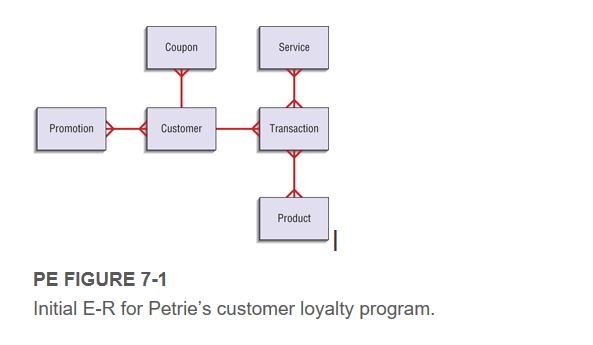Question
Petrie's Electronics Case Homework: Petrie's Electronics Case, Chapter 7, Questions 7-49. Please see rubric below. There are two parts to the homework Write an unambiguous
Petrie's Electronics Case Homework:
Petrie's Electronics Case, Chapter 7, Questions 7-49. Please see rubric below. There are two parts to the homework
Write an unambiguous definition for each attribute.
Then, redraw Figure 7-1 by placing the six (and additional) entities in this case on the diagram along with their associated attributes.
Answer does indicate an adequate definition for at minimum two of the attributes of each of the six entities on the PE Figure 7-1. Be sure to make one of them the primary key.
Show the six entities, the lines connecting them, and the cardinality. You must update the cardinality from Figure 7-1.
BE SURE TO CHANGE THE CARDINALITY from the below chart.

Use PE Table 7-1 on page 235 to come up with attributes and to determine cardinality.
Some files to help:
Week 4 MGMT 340 Live Lecture New.pptx
Creating_an_ERD_using_Visio_2010.doc
Week 4 PE Fig 7-1.docx
Week 4 PE Fig 7-1.vsd
Please use the textbook "essentrials of systems analysis and design" if necessary to answer this question but i think the instructions are clear enough above.
Thank you!!
I am responding to the reply here saying" reference missing". Please use the textbook , i do not know what you mean reference missing. Go to the textbook and read chapter 7 then answer question 7-49..SIMPLE!!!
I think this question is detailed enough and if you cannot answer it please let me know in time and STOP WASTING MY TIME WITH BACK AND FORTH.
CASE: PETRIE ELECTRONICS

Structuring Systems Requirements: Conceptual Data Modeling
Jim Watanabe, manager of the No Customer Escapes project and assistant director of IT for Petries Electronics, was sitting in the company cafeteria. He had just finished his house salad and was about to go back to his office when Stephanie Welch sat down at his table. Jim had met Stephanie once, back when he started work at Petries. He remembered she worked for the database administrator.
Hi, Jim, remember me? she asked.
Sure, Stephanie, how are you? How are things in database land?
Cant complain. Sanjay asked me to talk to you about the database needs for your new customer loyalty system. Stephanies phone binged. She pulled it out of her oversize bag and looked at it. She started to text as she continued to talk to Jim. How far along are you on your database requirements?
Thats kinda rude, Jim thought. Oh well. We are still in the early stages. I can send you a very preliminary E-R diagram we have [PE Figure 7-1], along with a description of the major entities.

PE FIGURE 7-1
Initial E-R for Petries customer loyalty program.
OK, that will help. I suspect that you wont have too many new entities to add to whats already in the system, Stephanie responded, still looking at her phone and still texting. She briefly looked up at Jim and smiled slightly before going back to texting. Just send the E-R to me, and Ill let you know if I have any questions. She stood up, still looking at her phone. Gotta go, she said, and she walked away.
OK, Jim thought, I need to remember to send Stephanie the preliminary E-R we have. I should probably send her the entity descriptions too (PE Table 7-1), just in case. Jim stood up, carried his tray over to the recycling area of the cafeteria, and went back to his office.
When Jim got back to his office, Sanjay was waiting for him.
Ive got more information on those alternatives we talked about earlier, Sanjay said. I had one of my employees gather some data on how the alternatives might satisfy our needs. (See the descriptions of the alternatives in PE Table 5-2.) Sanjay handed Jim a short report. The matrix shows the requirements and constraints for each alternative and makes it relatively easy to compare them. (See PE Figure 7-2.)
The matrix favors the XRA CRM system, Jim said, after looking over the report. It looks like their proposal meets our requirements the best, but the Nova groups proposal does the best job with the constraints.
PE TABLE 7-1:
Entity Descriptions for the Preliminary E-R Diagram for Petries Customer Loyalty System
| Entity | Description |
|---|---|
| Coupon | A coupon is a special promotion created specifically for an individual customer. A coupon is for a set dollar amount, for example, $10. The customer may use it like cash or like a dollars-off promotion when purchasing products or services. Coupons can only be created for an individual customer based on the points in his or her customer loyalty account. For each dollar value of a coupon, a certain number of points must be redeemed. Coupons must be accounted for when created and when redeemed. |
| Customer | A customer is someone who buys products and/or services from Petries Electronics. Customers include both online customers and those who shop in Petries brick-and-mortar stores. |
| Product | An item made available for sale to a Petries customer. For example, a product is a 40 Sony LCD HD television. Products can be purchased online or in brick-and-mortar stores. |
| Promotion | A promotion is a special incentive provided to a customer to entice the customer into buying a specific product or service. For example, a promotion intended to sell Blu-ray disks may involve 2-for-1 coupons. Promotions are targeted to all customers, or to subsets of customers, not just to individual customers. |
| Service | A job performed by one of Petries associates for a customer. For example, upgrading the memory in a computer by installing new memory cards is a service that Petries provides for a fee. Services may only be ordered and performed in brick-and-mortar stores, not online. |
| Transaction | A record that a particular product or service was sold to a specified customer on a particular date. A transaction may involve more than one product or service, and it may involve more than one of a particular kind of product or service. For example, one transaction may involve blank DVDs and prerecorded DVDs, and the prerecorded DVDs may all be of the same movie. For members of the loyalty program, each transaction is worth a number of points, depending on the dollar value of the transaction. |

PE FIGURE 7-2
Evaluation matrix for customer loyalty proposals.
Yes, but just barely, Sanjay said. There is only a five-point difference between XRA and Nova, so they are pretty comparable when it comes to constraints. But I think the XRA system has a pretty clear advantage in meeting our requirements.
XRA seems to be pretty highly rated in your matrix in terms of all of the requirements. You have XRA ranked better than the other two proposals for implementation, scalability, and vendor support, Jim said. The 5 you gave XRA for proven performance is one of the few 5s you have in your whole matrix.
Thats because XRA is one of the best companies in the industry to work with, Sanjay responded, The companys reputation is stellar.
This looks really promising, Jim said. Lets see if reality matches what we have here. Its time to put together the formal request for proposal. Ill get that work started today. I hope that all three of these companies decide to bid.
Case Questions
7-48. Review the data-flow diagrams given to you by your instructor. Study the data flows and data stored in these diagrams and decide whether you agree with the teams conclusion that the only six entity types needed are listed in the case and in PE Figure 7-1. If you disagree, define additional entity types, explain why they are necessary, and modify PE Figure 7-1 accordingly.
7-49. Again, review the DFDs you developed for the Petries Electronics case (or those given to you by your instructor). Use these DFDs to identify the attributes of each of the six entities listed in this case plus any additional entities identified in your answer to Case Question 7-48. Write an unambiguous definition for each attribute. Then, redraw PE Figure 7-1 by placing the six (and additional) entities in this case on the diagram along with their associated attributes.
7-50. Using your answer to Case Question 7-49, designate which attribute or attributes form the identifier for each entity type. Explain why you chose each identifier.
This is Figure 7-1

FIGURE 7DO YOU GUYS HAVE ACCESS TO TEXTBOOKS? ALSO I HAVE UPDATED THIS QUESTION WITH THE WHOLE MATERIAL FROM THE TEXTBOOK. Please use this information here to answer the questions needed. Thank you!
Coupon Service Promotion CustomerTransaction Product PE FIGURE 7-1 Initial E-R for Petrie's customer loyalty program Coupon Service Promotion CustomerTransaction Product PE FIGURE 7-1 Initial E-R for Petrie's customer loyalty programStep by Step Solution
There are 3 Steps involved in it
Step: 1

Get Instant Access to Expert-Tailored Solutions
See step-by-step solutions with expert insights and AI powered tools for academic success
Step: 2

Step: 3

Ace Your Homework with AI
Get the answers you need in no time with our AI-driven, step-by-step assistance
Get Started


